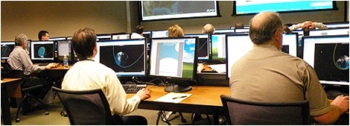Jul 12 2013
A subcontract from Clarkson Aerospace, through the U.S. Air Force — Air Force Research Laboratory Sensors Directorate is helping boost minorities in nanotechnology, analysis and intelligence fields through the University of Dayton School of Engineering Nanotechnology-Focused Minority Analyst Project.
 This room at the Advanced Technical Intelligence Center in Beavercreek, Ohio, shows analysts at work. Source: Advanced Technical Intelligence Center
This room at the Advanced Technical Intelligence Center in Beavercreek, Ohio, shows analysts at work. Source: Advanced Technical Intelligence Center
Nine students from the University of Dayton, Clark State and Central State are in the program. Seven students completed training during the spring semester and are now working in summer internships; six of them fulltime. Two new students are starting the program this summer.
"Being in the program has been a good conversation starter," said University of Dayton electrical engineering major Imani Sherman, a graduate of Cincinnati's Walnut Hills High School. "I tell people how much I've learned about gathering specialized intelligence, writing briefs and the different jobs available."
According to the U.S. Bureau of Labor Statistics, fewer than 13 percent of information security analysts and people working in related fields are black or Hispanic.
"A severe lack of diversity inside the field of analysis has been recognized by experts as a significant shortcoming for some time now," said Jeff Kramer, University of Dayton Research Institute sensor systems division research analyst and Nanotechnology-Focused Minority Analyst Project advisor. "In intelligence, diversity is important, because if everyone has the same background and experiences, you only get one point of view. Minority analysts can provide multicultural perspectives that are essential for success in this increasingly global world."
There are plenty of opportunities for minority analysts, as the Bureau of Labor Statistics projected employment of the group that covers information security analysts to grow by 22 percent between 2010 and 2020.
In the Nanotechnology-Focused Minority Analyst Project, students spend 12 to 20 hours a week receiving instruction from professional analysts on nanotechnology, cyber-networks, analytical software and geographic information systems, writing reports and deciphering political, cultural, economic and military information from around the globe. Outside the classroom, the students are required to follow the news to stay updated on current events. Once a week, they research, analyze, and write an 800- to 1,000-word report on topics ranging from uranium enrichment to ongoing conflicts in Africa.
The program's capstone project, a technical report and presentation titled "Development and Evolution of Nanotechnology in the International Marketplace," utilizes the skills the students have cultivated during the program.
The students worked this spring at the University of Dayton Research Institute's location in TechTown, on the University of Dayton and Central State University's campuses, and the Advanced Technical Intelligence Center in Beavercreek.
Any students interested in learning more about the program can contact Kramer at [email protected].
The Nanotechnology-Focused Minority Analyst Project is part of a Clarkson Aerospace program with the Air Force called the Minority Leaders Program. The University of Dayton has received funding during the past seven years for Minority Leaders Program initiatives, according to Charles E. Browning, chair of the University of Dayton chemical and materials engineering department and a program manager for the Minority Leaders Program.
"The Minority Leaders Program is dedicated to increasing diversity in the fields of science and engineering. It recently has expanded its technical focus from materials and sensors to include information analysis and cyber security, giving rise to the Nanotech-Focused Minority Analyst Program," Browning said. "Our involvement in the program has produced numerous graduates who are either working in STEM industries or pursuing advanced degrees."
The Minority Leaders Program is among the many initiatives to support minorities in science, technology, engineering and math fields at the University of Dayton. For almost 20 years, the School of Engineering's Minority Engineering Program has created opportunities and increased the number of diverse candidates for the region's engineering companies, according to University of Dayton School of Engineering Dean Tony Saliba.
"We cannot thank the Air Force and Clarkson Aerospace enough for helping support these initiatives," Saliba said. "These opportunities improve retention and graduation rates for minority students — about 80 percent for the program — and offer pathways to good jobs."
For more information, contact Shawn Robinson, associate director of media relations, at 937-229-3391 or [email protected].